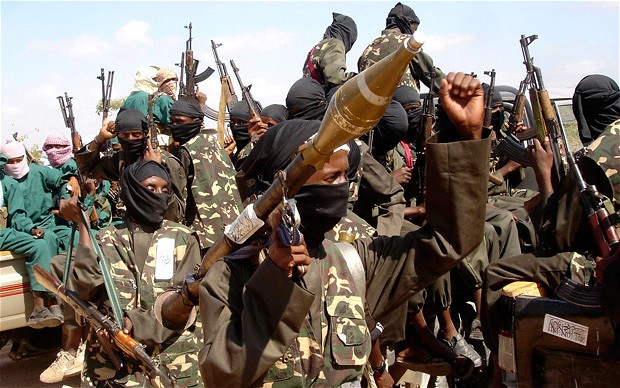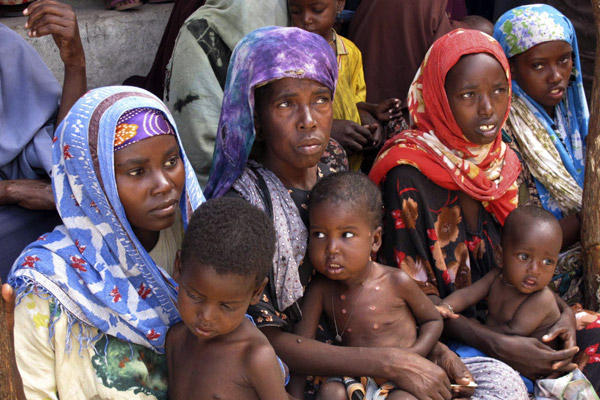By Eric Acha
London: 14 February 2012
 Image by Reuters
Image by Reuters
Somalia is once again in the spot light, this time from a rather rare, positive and an optimistic perspective. The highly anticipated London Conference on Somalia will be hosted by the British government on 23 February 2012 in London. The conference is geared at rallying the international community and increasing efforts aimed at resolving the almost two decade long conflict in Somalia.
Having been tagged repeatedly with the failed –state banner, there is some optimism within the international community to see renewed efforts geared towards resolving the challenges facing the country. Policy experts have been left baffled over the last 20 years and have failed to recommend viable policies to end the conflict that has claimed thousands of lives and rendered the country ungovernable for so many years.
It is no secret that the United Nations, the African Union and the rest of the international community’s policy towards Somalia has failed. The question on the minds of many sceptics and pessimist today is “what shall the London conference achieve?” What new theme is being discussed that has not been discussed in the past and what new viable concept is the UK going to introduce that has not yet been tried in the past.
As the world eagerly looks forward to the outcome of the London conference, the UK foreign ministry is well convinced that the conference will mark a new beginning for Somalia. In their effort to show case this optimism, senior representatives from over 40 governments and multi-lateral organisations have been invited to convene in London on February 23, with the aim of delivering a new international approach to Somalia. Top on the agenda of the half day conference will be to discuss how the international community can step-up its efforts to tackle both the root causes and effects of the problems in Somalia, and then possibly come out with a roadmap for the country.
The thematic areas to be discussed include:
1. Security: When it comes to security, Somalia has and continues to rely solely on the African Union Mission In Somalia (AMISOM). AMISOM is mandated with conducting Peace Support Operations in Somalia to stabilize the situation in the country in order to create conditions for the conducting of Humanitarian activities.
Amongst the challenges facing AMISOM, are its sources of funding. Though the foot soldiers making up AMISOM are contributed by AU member states, the mission has been reliant on external bodies and stake holders who more often than usual have conflicting interests. Besides funding, AMISOM is continuously humiliated by an insurrection of internal factions within Somalia, who regard the mission as an occupying force. The ideology being propagated by members of these resistance factions is that, so long as AMISOM continue to carry out its mission in Somalia, the country will never be able to build its own national security force that will be answerable to a legitimate Somaliland government and not to foreign forces.
This therefore explains why security will be one of the sticky and tricky issues at the London conference. The most feared faction in the country at the moment is the al-Shabab militant group.
2. Political Process: Talking of a political process, there hasn’t been any viable and a sustainable political process in Somalia for the last 20 years, whence the reason why there is no legitimate government in the country. What is currently being referred to as a political platform in the country is build on a muddy and flawed framework designed to serve the interest of factions and tribes within Somalia rather than the entire Somaliland as a nation. Critics; both scholars and policy experts have argued that the political strategy has been weaved around untenable assumptions. Abdi Ismail Samatar; a professor in Geography and one of the country’s most vocal critics has argued that one of the reasons behind Somalia’s inability to build a sustainable governments is because the international community has encouraged and supported a tribalist and clientalist political agenda in the country, a situation that led to divisions and corruption within the population.
With a parliament made up of more than half a thousand MPs for a country of that size, it becomes evidently clear that the agenda of such a parliament is not to nourish and build an able government for the country but rather aimed at sharing the national cake to the various tribes constituting Somaliland. This makes it practically impossible to genuinely debate and pass legislature governed by the democratic principle for the interest of Somalia as a nations.
This therefore implies that for Somalia to move forward and be guaranteed a governable state and a sustainable government, the London conference must agree on what should replace the current Transitional Federal Government (TFG), and that will be accepted by all Somalians. How to transform the transitional institutions in Mogadishu into structures that will ensure and foster socio-economic and political developments will be top on the topic’s agenda.
Whatever ever entity that would replace the TFG, it must be able to operate within a broad constitutional framework, and whether such an entity will be sub national or a full national government remains a question to be answered.
Local Stability: With factions fighting each one another and all with diverse and opposing opinions and agendas, maintaining stability within the Somaliland borders has proven to pose a daunting challenge to all the stake holders involved so far. Critics and sceptics of the current efforts to maintain stability within the country have argued that the international community has encouraged and continue to support a dual-track policy which exploits Somalia’s fragmented community and conflict for resource and power competition. This concept has sawn a seed of distrust into many Somalians who approach every single effort aimed at stabilizing the country with often misplaced suspicion. Most Somalians will be expecting a renewed and transparent package from the conference that will fairly encourage efforts geared toward stabilizing the country.
4. Counter Terrorism: For most part of its existence over the last 20 years or so, Somalia has been regarded as a breeding ground for terrorism on the horn of Africa. It has provided shelter and acted as a save heaven for some of the most feared terrorists around the world. The absence of an able government in the country encouraged and nourished an environment of lawlessness, where terrorist cells and networks could flourish undeterred.
5. Piracy: It is believed that Somalia has one of the most sophisticated and dangerous piracy networks in the world that has over the years transformed into a million dollar business model. Though this new gold mind industry for the pirates may be only a million dollar industry, the economic cost of their pirate activities is estimated in billions. In a recent recent paper by Anna Bowden and Shikha Basnet published by the One Earth Future Foundation, it is estimated that Somali piracy cost between $6.6 and $6.9 billion in 2011, down from a figure of $7 to $12 billion in 2010, and the shipping industry bore over 80 percent of these costs as a result of ransoms, higher insurance, security equipment and guards, re-routing of ships, increased speed and burning of more fuel, compensation of kidnapped seafarers, prosecutions and imprisonment, military operations, and the creation of anti-piracy organizations etc etc.
The international community has mobilised resources in the past to fight this crime, but with little success, giving the absence of a reliable government in the country that is capable of coordinating such efforts.
The London conference is expected to designed new strategies that will effectively combat a networked generating millions of dollars to many Somalians who have adopted piracy as a way of life. On one of the many propaganda websites managed by some factions in the country, they are of the opinion that talks on fighting piracy are ill intended, and aimed at restricting Somali territorial water and the utilization of marine resources, imposition of Exclusive Economic Zone (EEZ), continuation of illegal fishing and dumping toxic waste. The London conference is therefore tasked with introducing a much more robust strategy to effectively combat this crime. This may involve socio-economic alternatives for those most venerable to the flourishing piracy industry.
6. Humanitarians: What the half-day conference aims at achieving, especially on the humanitarian crisis in Somalia keeps pondering the mind of many experts, many of whom are of the view that the humanitarian crisis in Somalia require a gathering of its own, giving the magnitude and implications of the crisis. The refugee problems emanating from Somalia have spread into neighbouring countries and hence becoming a regional rather than a national issue.
 Internationally displaced peoples (IDP) camps are scattered all across the country and border towns in neighbouring countries. The atmosphere in most of these camps is often that of fear and hunger. These groups of displaced Somalians are constantly frightened by the threats coming from Al-Shahab. Besides the insecurity issue, natural disasters such as drought add more stress and pressure onto these vulnerable communities, making a bad situation even worse.
Internationally displaced peoples (IDP) camps are scattered all across the country and border towns in neighbouring countries. The atmosphere in most of these camps is often that of fear and hunger. These groups of displaced Somalians are constantly frightened by the threats coming from Al-Shahab. Besides the insecurity issue, natural disasters such as drought add more stress and pressure onto these vulnerable communities, making a bad situation even worse.
Earlier this year, the UN spokes person in Mogadishu; Russell Geekie described the situation as the worse and largest humanitarian crisis in the world. Until the World Food Program stepped up their effort and increased their presence in Somalia last December, the under-funded Somali Rehabilitation and Development Agency was the sole arbiter in most of these IDP camps.
So as we all look forward to the London conference with great optimism, the reality is that the half day conference is unlikely to achieve any tangible results with regards to the humanitarian crisis in Somalia. The humanitarian crisis deserves another gathering of its own.
7. International Coordination: If one were to select a country as a lab for testing international and inter-organisational policy, Somalia would be the perfect policy lab. The country has served as a policy-testing lab for one failed policy after the other over the last 20 years. International and regional organisations have worked hand in hand alongside bilateral partners to design a sustainable and viable policy that could help end the conflict tearing the country without any success.
The United Nations, together with the African Union have champion and led such experimental policies, but as we all know today, none has been successful. There have been claims and counter claims on why no policy seem to be a viable policy for Somalia. On one hand, the international community and other partners are blamed for not addressing the root causes of the conflict while on the other hand, Somalians themselves have been accused of jeopardizing and frustrating every single endeavour aimed at stabilizing and bringing peace to the country. This therefore implies that whatever comes out of the London conference, it will be practically impossible to effectively implement any viable policy without the full and unconditional participation of the Somalians.
Ambassador David Shin, (former US ambassador to Ethiopia and Bukina Faso) recently stated that he doubts that it will be possible to end the conflict in Somalia unless the Somalis huddle to discuss their future at their expenses inside Somalia without foreign participation. The reality we know is that, left alone, Somalia is nowhere close to resolving its conflict without foreign assistance. They have continuously demonstrated over the past 20 years that they are unable to put their house in order without external assistance.
The good news is that the London conference seems to be a new dawn in the attempt to end the conflict on the Horn of Africa.



